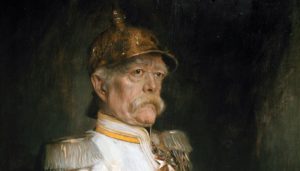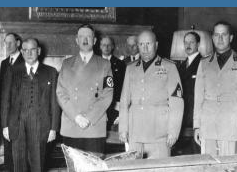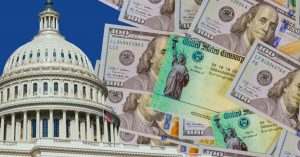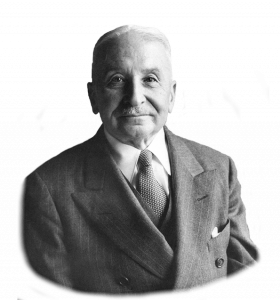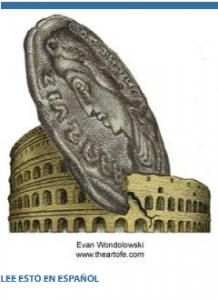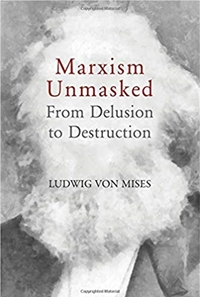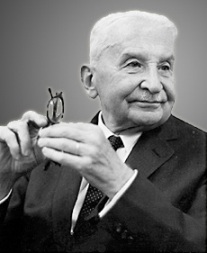[This essay originally appeared in Christian Economics, March 4, 1958. It was reprinted as chapter 10 of Planning for Freedom.]Our economic system — the market economy or capitalism — is a system of consumers’ supremacy. The customer is sovereign; he is, says a popular slogan, “always right.” Businessmen are under the necessity of turning out what the consumers ask for and they must sell their wares at prices which the consumers can afford and are prepared to pay. A business operation is a manifest failure if the proceeds from the sales do not reimburse the businessman for all he has expended in producing the article. Thus the consumers in buying at a definite price determine also the height of the wages that are paid to all those engaged in the industries.1.
Read More »Articles by Ludwig von Mises
Governments Never Give Up Power Voluntarily
March 1, 2024[A selection from Liberalism.]All those in positions of political power, all governments, all kings, and all republican authorities have always looked askance at private property. There is an inherent tendency in all governmental power to recognize no restraints on its operation and to extend the sphere of its dominion as much as possible. To control everything, to leave no room for anything to happen of its own accord without the interference of the authorities—this is the goal for which every ruler secretly strives. If only private property did not stand in the way! Private property creates for the individual a sphere in which he is free of the state. It sets limits to the operation of the authoritarian will. It allows other forces to arise side by side with and
Read More »The Real Meaning of Inflation and Deflation
January 2, 2024[Excerpted from Chapter 17 of Human Action.]
The services money renders are conditioned by the height of its purchasing power. Nobody wants to have in his cash holding a definite number of pieces of money or a definite weight of money; he wants to keep a cash holding of a definite amount of purchasing power. As the operation of the market tends to determine the final state of money’s purchasing power at a height at which the supply of and the demand for money coincide, there can never be an excess or a deficiency of money.
Each individual and all individuals together always enjoy fully the advantages which they can derive from indirect exchange and the use of money, no matter whether the total quantity of money is great or small. Changes in money’s purchasing
Socialism vs. Economic Freedom
December 5, 2023[From Economic Policy: Thoughts for Today and Tomorrow (1979), Lecture 2, "Socialism" (1958)]
I am here in Buenos Aires as a guest of the Centro de Difusión Economía Libre.1 What is economía libre? What does this system of economic freedom mean? The answer is simple: it is the market economy, it is the system in which the cooperation of individuals in the social division of labor is achieved by the market. This market is not a place; it is a process, it is the way in which, by selling and buying, by producing and consuming, the individuals contribute to the total workings of society.
In dealing with this system of economic organization—the market economy—we employ the term “economic freedom.” Very often, people misunderstand what it means, believing that economic
The Nationalization of Credit?
March 1, 2023Arthur Travers-Borgstroem, a Finnish writer, published a book entitled Mutualism that deals with ideas of social reform, and culminates in a plea for the nationalization of credit. A German edition appeared in 1923. In 1917, the author had established a foundation under his name in Berne, Switzerland, whose primary objective was the conferring of prizes for writings on the nationalization of credit. The panel of judges consisted of Professors Diehl, Weyermann, Milhaud, and Reichesberg, the bankers Milliet, Somary, Kurz, and others. The judges awarded a prize to a paper submitted by Dr. Robert Deumer, director of the Reichsbank in Berlin. This paper was published in book form by the Mutualist Association of Finland.1
From the background material of the paper we can
The Idea of Liberty Is Western
September 25, 2022[This article is excerpted from chapter 21 of Money, Method, and the Market Process, a collection of essays selected and edited by Margit von Mises and with an introduction by Richard M. Ebeling.]
I
The history of civilization is the record of a ceaseless struggle for liberty.
Social cooperation under the division of labor is the ultimate and sole source of man’s success in his struggle for survival and his endeavors to improve as much as possible the material conditions of his well-being. But as human nature is, society cannot exist if there is no provision for preventing unruly people from actions incompatible with community life. In order to preserve peaceful cooperation, one must be ready to resort to violent suppression of those disturbing the peace. Society
Wages, Unemployment, and Inflation
September 19, 2022Our economic system—the market economy or capitalism—is a system of consumers’ supremacy. The customer is sovereign; he is, says a popular slogan, “always right.” Businessmen are under the necessity of turning out what the consumers ask for and they must sell their wares at prices which the consumers can afford and are prepared to pay. A business operation is a manifest failure if the proceeds from the sales do not reimburse the businessman for all he has expended in producing the article. Thus the consumers in buying at a definite price determine also the height of the wages that are paid to all those engaged in the industries.
1. Wages Ultimately Paid by the Consumers
It follows that an employer cannot pay more to an employee than the equivalent of the value
The Sphere of Economic Calculation
August 23, 20221. The Character of Monetary Entries
Economic calculation can comprehend everything that is exchanged against money.
The prices of goods and services are either historical data describing past events or anticipations of probable future events. Information about a past price conveys the knowledge that one or several acts of interpersonal exchange were effected according to this ratio. It does not convey directly any knowledge about future prices. We may often assume that the market conditions which determined the formation of prices in the recent past will not change at all or at least not change considerably in the immediate future so that prices too will remain unchanged or change only slightly.
Such expectations are reasonable if the prices concerned were the
Economic Causes of War
August 15, 2022War is a primitive human institution. From time immemorial, men were eager to fight, to kill, and to rob one another. However, the acknowledgment of this fact does not lead to the conclusion that war is an indispensable form of interpersonal relations and that the endeavors to abolish war are against nature and therefore doomed to failure.
We may, for the sake of argument, admit the militarist thesis that man is endowed with an innate instinct to fight and to destroy. However, it is not these instincts and primitive impulses that are the characteristic features of man. Man’s eminence lies in his reason and in the power to think, which distinguishes him from all other living creatures. And man’s reason teaches him that peaceful cooperation and collaboration under
Exchange within Society
July 22, 20221. Autistic Exchange and Interpersonal Exchange
Action always is essentially the exchange of one state of affairs for another state of affairs. If the action is performed by an individual without any reference to cooperation with other individuals, we may call it autistic exchange. An instance: the isolated hunter who kills an animal for his own consumption; he exchanges leisure and a cartridge for food.
Within society cooperation substitutes interpersonal or social exchange for autistic exchanges. Man gives to other men in order to receive from them. Mutuality emerges. Man serves in order to be served.
The exchange relation is the fundamental social relation. Interpersonal exchange of goods and services weaves the bond which unites men into society. The societal
The Role of Ideas
July 9, 20221. Human Reason
Reason is man’s particular and characteristic feature. There is no need for praxeology to raise the question whether reason is a suitable tool for the cognition of ultimate and absolute truth. It deals with reason only as far as it enables man to act.
All those objects which are the substratum of human sensation, perception, and observation also pass before the senses of animals. But man alone has the faculty of transforming sensuous stimuli into observation and experience. And man alone can arrange his various observations and experiences into a coherent system.
Action is preceded by thinking. Thinking is to deliberate beforehand over future action and to reflect afterward upon past action. Thinking and acting are inseparable. Every action is
The German Rejection of Classical Economics
June 3, 20221. The German Rejection of Classical Economics
The hostility that the teachings of Classical economic theory encountered on the European continent was primarily caused by political prepossessions. Political economy as developed by several generations of English thinkers, brilliantly expounded by Hume and Adam Smith and perfected by Ricardo, was the most exquisite outcome of the philosophy of the Enlightenment. It was the gist of the liberal doctrine that aimed at the establishment of representative government and equality of all individuals under the law. It was not surprising that it was rejected by all those whose privileges it attacked. This propensity to spurn economics was considerably strengthened in Germany by the rising spirit of nationalism. The
Carl Menger and the Austrian School of Economics
June 1, 2022A Selection from The Historical Setting of the Austrian School of Economics.
1. The Beginnings
What is known as the Austrian School of Economics started in 1871 when Carl Menger published a slender volume under the title Grundsätze der Volkswirtschaftslehre.
It is customary to trace the influence that the milieu exerted upon the achievements of genius. People like to ascribe the exploits of a man of genius, at least to some extent, to the operation of his environment and to the climate of opinion of his age and his country. Whatever this method may accomplish in some cases, there is no doubt that it is inapplicable with regard to those Austrians whose thoughts, ideas and doctrines matter for mankind. Bernard Bolzano, Gregor Mendel and Sigmund Freud were not
Economic Aspects of the Pension Problem
March 8, 2022On Whom Does the Incidence Fall?
Whenever a law or labor union pressure burdens the employers with an additional expenditure for the benefit of the employees, people talk of “social gains.” The idea implied is that such benefits confer on the employees a boon beyond the salaries or wages paid to them and that they are receiving a grant which they would have missed in the absence of such a law or such a clause in the contract. It is assumed that the workers are getting something for nothing.
This view is entirely fallacious. What the employer takes into account in considering the employment of additional hands or in discharging a number of those already in his service, is always the value of the services rendered or to be rendered by them. He asks himself: How much
Planned Chaos
December 6, 2021The characteristic mark of this age of dictators, wars, and revolutions is its anti-capitalistic bias. Most governments and political parties are eager to restrict the sphere of private initiative and free enterprise. It is an almost unchallenged dogma that capitalism is done for and that the coming of all-around regimentation of economic activities is both inescapable and highly desirable.
Nonetheless capitalism is still very vigorous in the Western Hemisphere. Capitalist production has made very remarkable progress even in these last years. Methods of production were greatly improved. Consumers have been supplied with better and cheaper goods and with many new articles unheard of a short time ago. Many countries have expanded the size and improved the quality
Why Bureaucrats Aren’t Like Private Sector Workers
November 8, 2021Bureaucratic management means, under democracy, management in strict accordance with the law and the budget. It is not for the personnel of the administration and for the judges to inquire what should be done for the public welfare and how the public funds should be spent. This is the task of the sovereign, the people, and their representatives. The courts, the various branches of the administration, the army, and the navy execute what the law and the budget order them to do. Not they but the sovereign is policy-making.
Most of the tyrants, despots, and dictators are sincerely convinced that their rule is beneficial for the people, that theirs is government for the people. There is no need to investigate whether these claims of Messrs. Hitler, Stalin, and Franco
Monetary Policy and the Present Trend toward Central Planning
October 28, 2021Monetary Policy and the Present Trend toward All-around Planning
The people of all countries agree that the present state of monetary affairs is unsatisfactory and that a change is highly desirable. However, ideas about the kind of reform needed and about the goal to be aimed at differ widely. There is some confused talk about stability and about a standard which is neither inflationary nor deflationary. The vagueness of the terms employed obscures the fact that people are still committed to the spurious and self-contradictory doctrines whose very application has created the present monetary chaos.
The destruction of the monetary order was the result of deliberate actions on the part of various governments. The government-controlled central banks and, in the
The Economic Foundations of Freedom
October 7, 2021Ludwig von Mises noted: “[T]he gold standard is not a game, but a social institution. Its working does not depend on the preparedness of any people to observe some arbitrary rules. It is controlled by the operation of inexorable economic law.” and furthermore: “What the expansionists call the defects of the gold standard are indeed its very eminence and usefulness. It checks large-scale inflationary ventures on the part of governments. The gold standard did not fail. The governments were eager to destroy it, because they were committed to the fallacies that credit expansion is an appropriate means of lowering the rate of interest and of “improving” the balance of trade.”
Photo via mises.org – Click to enlarge
[Economic Freedom and Interventionism (1980)]
Currency Debasement and Social Collapse
October 3, 2021Knowledge of the effects of government interference with market prices makes us comprehend the economic causes of a momentous historical event, the decline of ancient civilization.
It may be left undecided whether or not it is correct to call the economic organization of the Roman Empire capitalism. At any rate it is certain that the Roman Empire in the 2nd century, the age of the Antonines, the “good” emperors, had reached a high stage of the social division of labor and of interregional commerce. Several metropolitan centers, a considerable number of middle-sized towns, and many small towns were the seats of a refined civilization.
The inhabitants of these urban agglomerations were supplied with food and raw materials not only from the neighboring rural
The Bureaucrat as a Voter
May 3, 2021The bureaucrat is not only a government employee. He is, under a democratic constitution, at the same time a voter and as such a part of the sovereign, his employer. He is in a peculiar position: he is both employer and employee. And his pecuniary interest as employee towers above his interest as employer, as he gets much more from the public funds than he contributes to them.
This double relationship becomes more important as the people on the government’s payroll increase. The bureaucrat as voter is more eager to get a raise than to keep the budget balanced. His main concern is to swell the payroll.
The political structure of Germany and France, in the last years preceding the fall of their democratic constitutions, was to a very great extent influenced by the
Money, Interest, and the Business Cycle
February 18, 2021[This essay is a selection from lecture 7 in Marxism Unmasked: From Delusion to Destruction.]
The banks very often expand credit for political reasons. There is an old saying that if prices are rising, if business is booming, the party in power has a better chance to succeed in an election campaign than it would otherwise. Thus the decision to expand credit is very often influenced by the government that wants to have “prosperity.” Therefore, governments all over the world are in favor of such a credit-expansion policy.
On the market, credit expansion creates the impression that more capital and savings are available than actually are, and that projects which yesterday were not practical because of the higher interest rate are feasible today because conditions
Politics and Ideas
February 9, 2021In the Age of Enlightenment, in the years in which the North Americans founded their independence, and a few years later, when the Spanish and Portuguese colonies were transformed into independent nations, the prevailing mood in Western civilization was optimistic. At that time all philosophers and statesmen were fully convinced that we were living at the beginning of a new age of prosperity, progress, and freedom. In those days people expected that the new political institutions—the constitutional representative governments established in the free nations of Europe and America—would work in a very beneficial way, and that economic freedom would continuously improve the material conditions of mankind.
We know very well that some of these expectations were too
Understanding the Roots and Causes of Inflation
January 27, 2021[This is the fourth lecture from Mises’s “Economic Policy: Thoughts for Today and Tomorrow“]
If the supply of caviar were as plentiful as the supply of potatoes, the price of caviar—that is, the exchange ratio between caviar and money or caviar and other commodities—would change considerably. In that case, one could obtain caviar at a much smaller sacrifice than is required today. Likewise, if the quantity of money is increased, the purchasing power of the monetary unit decreases, and the quantity of goods that can be obtained for one unit of this money decreases also.
When, in the sixteenth century, American resources of gold and silver were discovered and exploited, enormous quantities of the precious metals were transported to Europe. The result of this
Mises Explains the Santa Claus Principle
December 22, 2020[From “The Exhaustion of the Reserve Fund” in Human Action, chap. 36.]
The idea underlying all interventionist policies is that the higher income and wealth of the more affluent part of the population is a fund which can be freely used for the improvement of the conditions of the less prosperous. The essence of the interventionist policy is to take from one group to give to another. It is confiscation and distribution. Every measure is ultimately justified by declaring that it is fair to curb the rich for the benefit of the poor.
In the field of public finance progressive taxation of incomes and estates is the most characteristic manifestation of this doctrine. Tax the rich and spend the revenue for the improvement of the condition of the poor, is the principle of
Individualism and the Industrial Revolution
December 21, 2020[Marxism Unmasked (2006)]
Liberals stressed the importance of the individual. The 19th-century liberals already considered the development of the individual the most important thing. “Individual and individualism” was the progressive and liberal slogan. Reactionaries had already attacked this position at the beginning of the 19th century.
The rationalists and liberals of the 18th century pointed out that what was needed was good laws. Ancient customs that could not be justified by rationality should be abandoned. The only justification for a law was whether or not it was liable to promote the public social welfare. In many countries the liberals and rationalists asked for written constitutions, the codification of laws, and for new laws which would permit the
What “Capitalism” Really Means
December 14, 2020[Economic Policy: Thoughts for Today and Tomorrow (1979), lecture 1 (1958)]
Descriptive terms which people use are often quite misleading. In talking about modern captains of industry and leaders of big business, for instance, they call a man a “chocolate king” or a “cotton king” or an “automobile king.” Their use of such terminology implies that they see practically no difference between the modern heads of industry and those feudal kings, dukes or lords of earlier days. But the difference is in fact very great, for a chocolate king does not rule at all; he serves. He does not reign over conquered territory, independent of the market, independent of his customers. The chocolate king—or the steel king or the automobile king or any other king of modern
Read More »Warum die Anhänger des freien Marktes die Sozialisten unterschätzen
December 5, 20202. Dezember 2020 – von Ludwig von Mises
Ludwig von Mises (1881-1973)
Die breite Masse der Menschen hängt keiner eigenen Idee an, weder einer guten, noch einer schlechten. Stattdessen suchen sie sich unter den vielen von intellektuellen Vordenkern erdachten Ideologien eine aus. Ihre Wahl aber ist verbindlich und bestimmt den Gang der Dinge. Wenn die Masse schlechte Grundsätze bevorzugt, ist das Unheil nicht mehr abzuwenden.
Die Sozialphilosophie der Aufklärung verkannte die Gefahr, die von der Vorherrschaft schlechter Ideen ausgeht. Die gewöhnlich angebrachten Einwände gegen den Vernunftglauben der klassischen Ökonomen und Utilitaristen sind nicht stichhaltig. Dennoch hat ihr Ansatz einen Mangel. Sie waren der Ansicht, dass sich das Vernünftige, einfach weil es
When Governments Confiscate Wealth to Fund Government Programs
December 2, 2020The entrepreneurs try to undertake only such projects as appear to promise profits. This means that they endeavor to use the scarce means of production in such a way that the most urgent needs will be satisfied first, and that no part of capital and labor will be devoted to the satisfaction of less urgent needs as long as a more urgent need, for whose satisfaction they could be used, goes unsatisfied.
When the government intervenes to make possible a project which promises, not profits, but losses, then there is only talk in public of the need which finds satisfaction through this intervention; we do not hear anything of the needs which fail to be satisfied because the government has diverted to other purposes the means of satisfying them. Only what is gained by
Socialists Have Never Shown How They Could Increase the Standard of Living
November 4, 2020[A selection from Nation, State, and Economy. Editor’s note: When Mises refers to “liberals” or “liberalism” he means the ideology of laissez-faire, sometimes now called “classical liberalism.”]
Marxism sees the coming of socialism as an inescapable necessity. Even if one were willing to grant the correctness of this opinion, one still would by no means be bound to embrace socialism. It may be that despite everything we cannot escape socialism, yet whoever considers it an evil must not wish it onward for that reason and seek to hasten its arrival; on the contrary, he would have the moral duty to do everything to postpone it as long as possible. No person can escape death; yet the recognition of this necessity certainly does not force us to bring about death as
Understanding the Proper Meaning of “Equality”
November 1, 2020[A Selection from Liberalism: In the Classical Tradition.]
Equality
Nowhere is the difference between the reasoning of the older liberalism and that of neoliberalism clearer and easier to demonstrate than in their treatment of the problem of equality. The liberals of the eighteenth century, guided by the ideas of natural law and of the Enlightenment, demanded for everyone equality of political and civil rights because they assumed that all men are equal. God created all men equal, endowing them with fundamentally the same capabilities and talents, breathing into all of them the breath of His spirit. All distinctions between men are only artificial, the product of social, human — that is to say, transitory — institutions. What is imperishable in man — his spirit —







